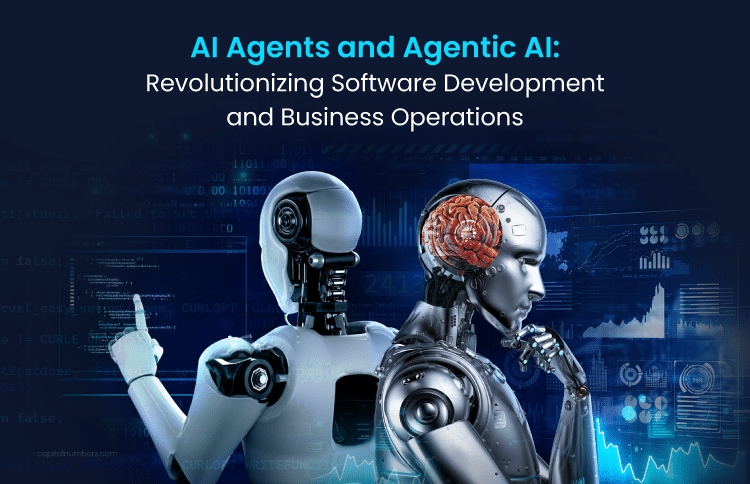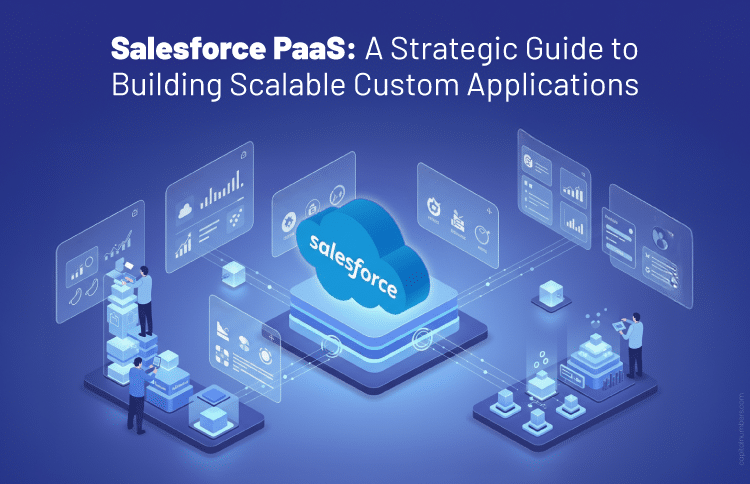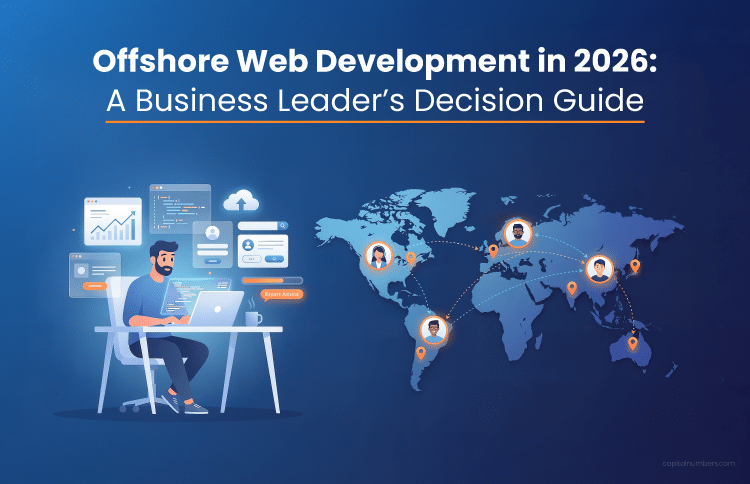AI Agents and Agentic AI: Revolutionizing Software Development and Business Operations
Table of Contents
Artificial intelligence continues to evolve at a remarkable pace, with AI agents and agentic AI emerging as transformative technologies that are reshaping how we approach complex tasks across industries. While generative AI has captured public attention through content creation tools, agentic AI represents the next frontier, autonomous systems that can independently pursue goals and complete multi-step tasks with minimal human intervention. This blog explores the fundamentals of AI agents, their applications in software development, how they simplify complex processes, and how they differ from traditional generative AI.
Understanding AI Agents and Agentic AI: The Fundamentals
AI agents are autonomous software systems that use artificial intelligence to pursue goals and complete tasks on behalf of users. Unlike traditional software that follows predetermined rules, AI agents demonstrate reasoning, planning, and memory capabilities with the autonomy to make decisions, learn from experience, and adapt to changing circumstances. These intelligent systems can process multimodal information like text, voice, video, audio, code and independently determine the most effective path to achieving specified objectives.
At their core, AI agents are rational actors that make decisions based on their perceptions and data to produce optimal performance. They operate through a systematic workflow:
- Determining goals: The agent receives instructions and breaks them down into smaller, actionable tasks
- Acquiring information: It gathers necessary data through various sources, including internet searches or interactions with other systems
- Implementing tasks: With sufficient information, the agent methodically completes each task, evaluating progress and adjusting as needed
Types of AI Agents
Several distinct types of AI agents exist, each with unique characteristics and capabilities:
- Simple reflex agents: Operate based on predefined rules and immediate data
- Model-based reflex agents: Evaluate probable outcomes before making decisions
- Goal-based agents: Compare different approaches to determine the most efficient path
- Utility-based agents: Use complex reasoning to maximize desired outcomes
- Learning agents: Continuously improve through experiences and feedback
- Hierarchical agents: Operate in organized tiers with higher-level agents coordinating lower-level ones
Transforming Software Development with AI Agents
The software development landscape is experiencing a profound shift as AI agents become integral to the development lifecycle. These intelligent systems are changing how developers approach their work, with 96% of developers globally believing AI agents will positively reshape the developer experience.
Code Generation and Quality Assurance
AI agents excel at generating, reviewing, and optimizing code. They can:
- Automatically generate code based on requirements
- Debug existing code and suggest improvements
- Rework code to enhance performance and efficiency
- Identify potential security vulnerabilities before deployment
This capability is already making a significant impact for instance, one platform reported generating seven million lines of code for customers, with 25-28% of new code being AI-generated and deployed to production.
Development Workflow Enhancement
Beyond code generation, AI agents streamline the entire development process by:
- Automating onboarding: Creating and updating documentation to help new developers quickly understand projects
- Managing DevOps workflows: Guiding deployment pipelines, automating rollbacks, and monitoring application performance
- Accelerating feedback loops: Identifying inefficiencies in CI/CD processes and suggesting improvements
- Supporting testing: Developing test cases and performing automated testing
Developer Focus Shift
Perhaps most importantly, AI agents are enabling developers to redirect their attention from routine coding tasks to higher-value activities. Rather than spending hours on manual coding, debugging, and data cleaning, developers can focus on:
- Complex problem-solving
- System architecture design
- Strategic decision-making
- Innovation and creative solutions
This shift is reflected in changing performance metrics, with 92% of developers now wanting their work evaluated based on impact rather than output volume.
You May Also Read: How Generative AI Is Transforming Businesses in 2025
How AI Agents Simplify Complex Processes
The simplification power of AI agents extends across various business functions and technical domains, creating significant efficiencies.
Autonomous Task Execution
AI agents can perform complex, multi-step tasks with minimal supervision. Unlike traditional automation tools that require explicit programming for each scenario, AI agents can:
- Adapt to changing conditions and requirements
- Make autonomous decisions based on available data
- Learn from past interactions to improve future performance
- Self-correct when encountering errors or obstacles
Streamlined Operations
By taking on routine tasks, AI agents free human workers to focus on more strategic activities. This leads to:
- Reduced manual workload and associated human error
- Faster execution of repetitive processes
- More consistent application of business rules and best practices
- Enhanced resource allocation to high-value activities
Enhanced Collaboration
AI agents can facilitate better collaboration between teams and systems by:
- Integrating with existing tools and platforms
- Curating and sharing information across departments
- Providing consistent interfaces for complex systems
- Facilitating communication between technical and non-technical stakeholders
Agentic AI vs. Generative AI: Understanding the Distinction
While both agentic AI and generative AI represent cutting-edge AI technologies, they serve fundamentally different purposes and operate in distinct ways.
Core Functional Differences
The primary distinction lies in their fundamental functions:
- Generative AI excels at producing content (text, images, code, etc.) based on specific prompts. It’s reactive, responding to user requests with creative outputs.
- Agentic AI focuses on achieving goals through autonomous decision-making and action. It’s proactive, independently determining and executing steps to complete objectives
This difference is succinctly captured in the observation that “Generative AI is about producing something new, while agentic AI is about achieving something specific. One creates, and the other acts”.
Table: Comparative Capabilities
| Aspect | Agentic AI | Generative AI |
|---|---|---|
| Core function | Executes multistep tasks autonomously to achieve a goal | Generates content based on specific prompts |
| Task complexity | Handles complex, chained tasks like research, analysis, and reporting | Best for discrete, single tasks like drafting and summarizing |
| Autonomy | High — can operate independently toward the set objective | Low — requires user direction for each step and output |
| Key benefit | Automates complex processes and tackles multifaceted problems, freeing significant time | Accelerates specific content creation and simple questions and answers |
| Key consideration | Requires clear goal definition, robust oversight, and validation checkpoints for complex actions | Requires careful prompting, and fact-checking is essential due to hallucination risks |
Use Case Differentiation
The technologies complement each other in an AI ecosystem:
- Use generative AI when you need creative content generation, specific answers, or content transformations
- Deploy agentic AI when you need autonomous execution of complex workflows, adaptive problem-solving, or ongoing task management without constant human direction
Many modern systems combine both approaches, using generative capabilities within agent frameworks to achieve sophisticated outcomes.
Real-World Applications Beyond Software Development
The versatility of AI agents extends far beyond software development, with applications across numerous business functions:
IT Support and Service Management
AI agents are transforming IT support by proactively identifying and resolving issues before they escalate. These systems can:
- Provide autonomous self-service for common IT needs
- Diagnose and resolve complex technical issues
- Integrate with enterprise systems for comprehensive problem resolution
- Learn from past interactions to continuously improve performance
Cybersecurity Operations
In the cybersecurity domain, AI agents offer powerful capabilities for protection and response:
- Real-time threat detection: Autonomous monitoring of network traffic and user behavior to identify potential threats
- Adaptive threat hunting: Proactive searching for hidden patterns and indicators of compromise
- Offensive security testing: Simulating cyberattacks to test organizational defenses
- Case management: Automating the classification, tracking, and resolution of security incidents
DevOps and Infrastructure Management
The Agentic DevOps approach represents a significant evolution in infrastructure management:
- Autonomous provisioning and configuration of infrastructure
- Continuous monitoring and anomaly detection
- Self-healing of infrastructure issues
- Optimization of resource allocation and costs
- Intelligent application deployment and rollout strategies
Challenges and Considerations for Implementation
While AI agents offer tremendous potential, organizations should be aware of several challenges:
Data Privacy and Security
Developing and operating advanced AI agents requires acquiring, storing, and processing large volumes of data, raising important privacy considerations. Organizations must implement robust data security measures and ensure compliance with relevant regulations.
Ethical Considerations
AI agents may sometimes produce unfair, biased, or inaccurate results, particularly in complex or novel situations. Implementing appropriate safeguards, including human oversight for critical decisions, helps ensure ethical deployment.
Technical Implementation Complexities
Implementing advanced AI agents requires specialized expertise in machine learning technologies and integration with existing systems. Organizations need developers who can integrate machine learning libraries with applications and train agents with domain-specific data.
Resource Requirements
Training and deploying sophisticated AI agents demands substantial computing resources. Organizations must consider the infrastructure investments needed to support these systems effectively.
Future Trends in AI Agent Development
Looking ahead, several emerging trends are shaping the evolution of AI agents:
Multi-Agent Collaboration
Future systems will increasingly feature teams of specialized AI agents working together to solve complex problems. These multi-agent systems will coordinate across different domains and organizations to achieve outcomes beyond the capabilities of individual agents
Enhanced Multimodal Capabilities
AI agents are becoming more adept at processing multiple forms of input – text, voice, images, video – simultaneously. This multimodal intelligence allows for more natural interactions and comprehensive understanding of complex environments.
Memory Augmentation and Context Awareness
Advanced memory systems will enable AI agents to maintain longer contexts, learn from past interactions, and develop more sophisticated reasoning capabilities. This enhancement will support more personalized and contextually relevant responses
You May Also Read: Democratizing AI: Building an AI-First Culture within Your Organization
Conclusion
AI agents and agentic AI represent a paradigm shift in how we approach complex tasks and workflows. By combining autonomous decision-making with powerful AI capabilities, these systems are transforming software development and numerous other fields. Unlike generative AI, which focuses on content creation, agentic AI emphasizes goal achievement through independent action and reasoning.
As the technology continues to mature, organizations that strategically implement AI agents will gain significant competitive advantages through enhanced productivity, reduced operational overhead, and the ability to tackle increasingly complex challenges. The future of work will increasingly feature collaboration between human experts and intelligent AI agents, each bringing unique strengths to solve the problems of tomorrow.


















